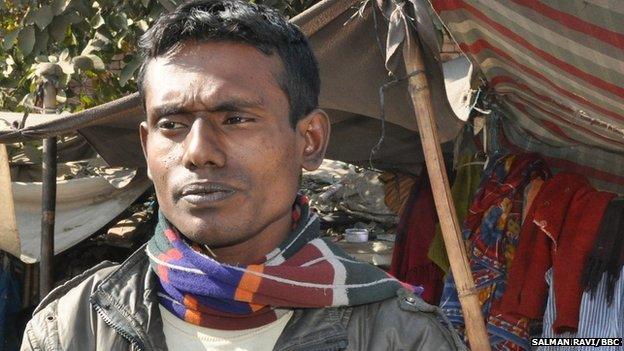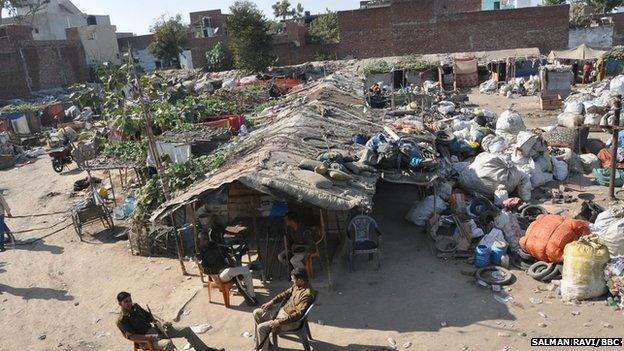Indian Agra Muslim fear conversions to Hinduism
- Published

Ramzan Sheikh, a witness to the ritual, said there was a lot of fear in the area
Nearly a dozen Indian Muslim families have fled their homes in Agra after 57 families were reportedly converted to Hinduism against their will.
Muslim organisations have accused Hindu nationalist groups, close to the governing BJP, of "forced conversions" and demanded action against them.
The Hindu groups have denied the charge and say the conversions were voluntary.
Meanwhile, opposition MPs have accused hardline Hindus of undermining India's unity and secular nature.
The issue has been hotly debated in parliament, with opposition parties demanding an explanation from Prime Minister Narendra Modi.
Critics say Hindu hardline groups are flexing their muscles under the new Bharatiya Janata Party (BJP) government, led by Mr Modi.
Recently, a row broke out after government minister Niranjan Jyoti used an abusive term to refer to non-Hindus, by asking people at a public rally to choose between Ramzada (children of the Hindu God Ram) and Haramzada (bastards).
Mr Modi said he disapproved of her language but refused to sack her.

Those who participated in the Agra conversion ceremony were poor rag-pickers

Analysis: Geeta Pandey, BBC News, Delhi
Religious conversions have been a topic of passionate debate in India for many years.
Hindu groups have often accused Christian missionaries and Muslims of converting poor, low-caste Dalits - formerly untouchables - and tribespeople with promises of a better life. In the past few years, Hindu hardline groups have started organising reconversion rituals they call "ghar vapasi" - which means "returning home".
The conversions - and re-conversions - in most cases allegedly involve force, fraud or inducement.
In Agra, it is alleged that local Hindus employed fraud (by not telling people they were going to be converted) and also offered inducement (by promising ration cards). The Hindu groups have denied the charges, saying the conversions were voluntary and that they intend to do many more.
It's barely six months since Narendra Modi led his BJP party to power and critics are already expressing fears over the future of religious minorities in the country. Mr Modi, who was accused of failing to stop deadly anti-Muslim riots in Gujarat in 2002 when he was chief minister, insists there is nothing to fear.
But his minister's remarks and the row over Agra's conversions mean many suspect his hardline supporters must be receiving quiet encouragement.

On Thursday, the residents of Vednagar slum in Agra told BBC Hindi's Salman Ravi that some 250 people had attended a havan (Hindu religious ceremony) on Monday.
Most residents of the slum are poor rag-pickers and many said they had been promised ration cards and other basic amenities by a local Hindu activist if they attended the event.
One slum resident, Salina, said she had no idea that it was a conversion ceremony. "During the ritual, suddenly we were made to do what the [Hindu] priest was doing. One Muslim man was even made to hold an idol in his hand.
"After the ritual was over, the local activist told us that we had all become Hindus. We wanted to protest, but we were advised to keep quiet as we were told we would get a ration card and other amenities."
Another resident Mumtaz, however, said that no-one had forced her to attend the ritual and that all those who attended had done so voluntarily.
Ramzan Sheikh, a witness to the ritual, said there was a lot of fear in the area. "We are scared. Whatever happened, we never expected," he said.
After receiving complaints from Muslims, police have registered a case against a Hindu activist who is accused of trying to convert Muslims by promising them food ration cards.
Police have also taken in for questioning a Muslim man supervises the rag-pickers in the slum and authorities have deployed armed policemen in the area as a precautionary measure.